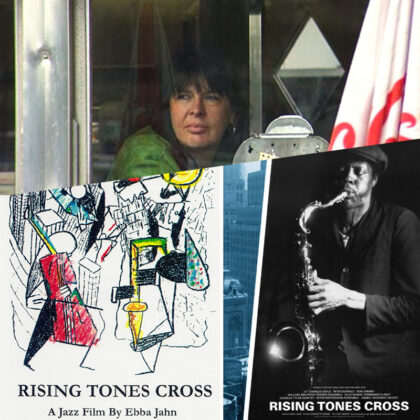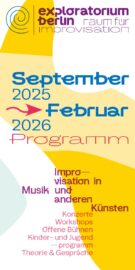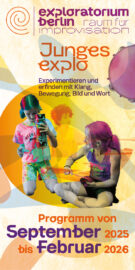40 years ago, filmmaker and producer Ebba Jahn made the legendary jazz film Rising Tones Cross. The film is a documentary composition about the new jazz, New York as the city from which it emerged, and the musicians who play it. The thoughts of saxophonist Charles Gayle and bassists William Parker and Peter Kowald accompany the work. In addition to the screening, Ebba Jahn will discuss her work on the film and its production in conversation with Mathias Maschat.
Ebba Jahn has been working as a filmmaker in the fields of documentary and experimental film since the early 1980s. With Rising Tones Cross (1985) she created an acclaimed portrait of New York’s improvisation and jazz scene, today regarded as an important historical document. Later works such as the short film collection Arts Interplay (2008) and the audiovisual dialogue IDEA – Miniatures by Improvisers (2022) also explore artistic processes at the intersections of music, visual art, and society. Her films, which combine precise observation with poetic openness, have been presented at international festivals and institutions such as Arsenal – Institute for Film and Video Art in Berlin. Alongside her own practice, Jahn works as an editor and curator, initiating projects that foreground dialogue between art forms, generations, and cultures.
Rising Tones Cross captures a moment in the early 1980s when now-renowned jazz musicians were building a new scene in the slipstream of punk and emerging hip hop, while remaining rooted in the history of jazz. The film is particularly striking in the way it addresses the different social contexts of improvised music in Europe and the U.S. – including the unequal conditions faced by Black and white musicians. What sets it apart from other jazz films is its visual and narrative focus on New York City as a metaphorical force behind this creative explosion: a metropolis shown as dirty, poor, raw, yet full of life. Through live performances, exclusive interviews, and everyday scenes, the musicians speak in their own voices – from Charles Gayle on musical influences to Peter Kowald’s reflections on performance, and an open discussion about the social impact of avant-garde music.
Featuring Charles Gayle, Peter Kowald, John Zorn, Wayne Horvitz, Billy Bang, Don Cherry, Peter Brötzmann, Irène Schweizer, Jemeel Moondoc and many more – with stage design by A. R. Penck for the William Parker & Patricia Nicholson Ensemble.


